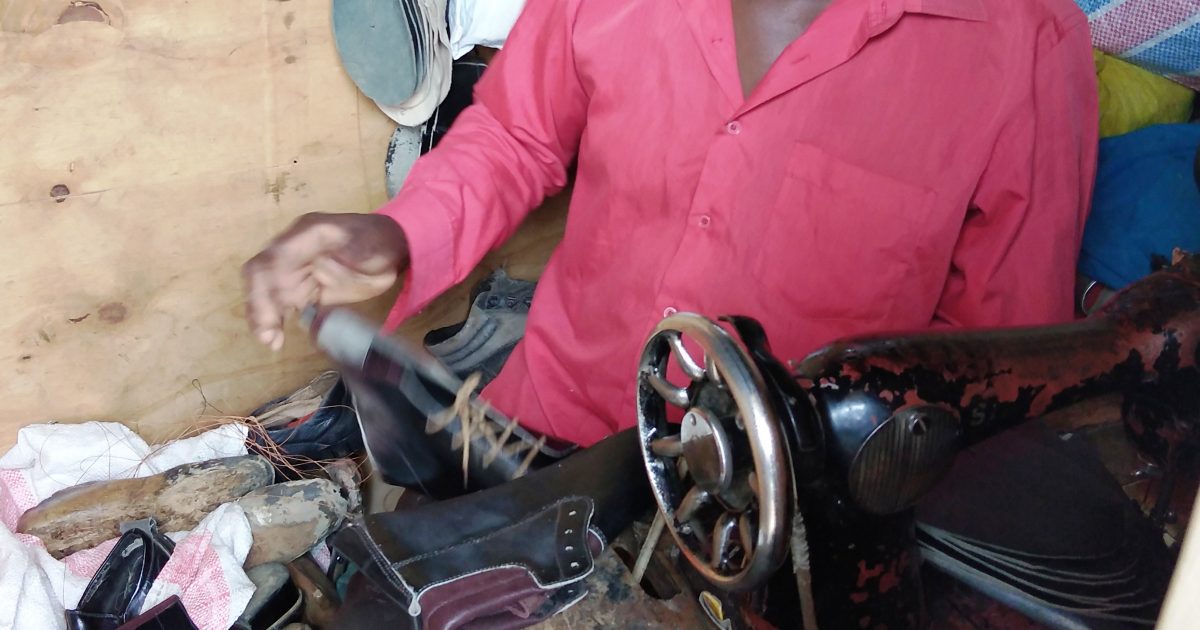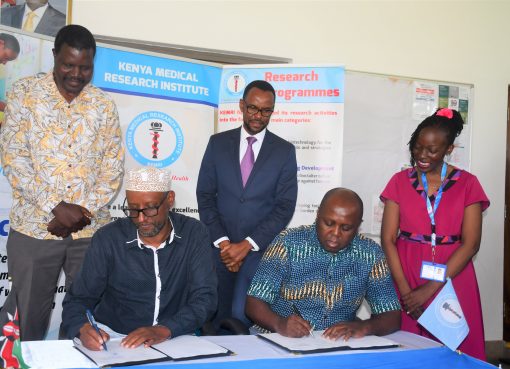Life, they say is a journey full of ups and downs, but how far can you go to achieve your dreams in the light of insurmountable challenges facing you? Rhetorical question that most of us may not have a definite answer to.
Most of us actually never take a minute to appreciate how blessed we are, not just financially, but in terms of health and other ways until a situation arises in your life to remind you so.
Meet Raphael Kosin Mwangi, Raphael is abled differently, he is physically challenged, being unable to use his lower limbs but has decided to make lemonade out of the bitter lemons.
The middle aged man who resides in London Estate in Narok town, has a small workshop where he works full time in the shoe industry.
Both his legs are not functioning, making him sit down most of the times.
Raphael got this disability at a tender age and growing up he slowly accepted the fact that he was different from other people. He remembers at one time when he inquired about his condition and the mother could not really explain to him but before her death she finally opened up that his condition was as a result of untreated polio.
He humorously says he is married to one wife and together they have two daughters both of whom are through with their secondary school education.
Raphael studied a designing course at Kericho Rehabilitation Centre for three years where he passionately indulged in boot and leather related productions.
Eager to earn money after the course, he went back to his rural home where he started his work and worked consistently for three years.
Fortunately for him, as fate would have it, his aunt offered to employ him in Narok town.
He immediately accepted the offer and moved to the town with so much expectations. “I saw that as an opportunity to finally get out of my comfort zone and I felt that accepting this offer was the right thing to do at the time,” he says.
The cobbler continued to work for her for almost seven years until he felt the need to transition and grow on his own.
“To date I eternally feel grateful to my aunt`s kindness, what I’m even more grateful for, is that I got to learn patience, resilience and hard work,” he says with a smile.
Looking back at his 25 years in this business, Raphael says he is happy with the progress he has made and feels that he has learnt a lot and he would like to even try and amend some of the past mistakes.
His main job is to make and design shoes of his customers’ choice in the case of direct orders but also innovate others for general sells.
Raphael says he has mastered the art of his work and can now confidently say he is at a good competitive standing skillfully as he now designs, safari boots and even school shoes.
In the past, he says, it was very difficult to get the necessary materials as much progress had not yet been made in the industry but now the situation has changed.
He says he procures the materials from Nairobi where he acquires the utilities such as gum, soles, rubber and more at a fairly good price as opposed to sourcing them locally from Narok town.
Raphael says the costs vary in accordance with standard or quality of the materials one need and also depends with different retail stores.
Sometimes when he is too busy, he says he just makes an order and is brought to him via public transport and picks them from parcels offices or bus stage in Narok town.
He also says part of his trade that he picked up over the years is to repair shoes when he noticed that there was a gap he would bridge in his area of work.
“Whenever people see a shoe shop the first thing that comes to mind is repairing shoes but not many shops were offering this service, that is when I decided to merge the two,” he says.
Raphael plans to expand his business in the future so as to even create job opportunities for others.
When he starts working on a pair of shoes in the morning, he says he is able to finish it at midday thus up by evening he can accomplish two pairs of shoes which we find quite satisfying.
The cobbler says he makes up to Sh.1, 000 on a good day and can even try and make an extra Sh. 1,000, if he puts up more effort on the repair work category.
What has helped him is offering a cost effective service to all his clients?
Raphael says he is driven towards innovative and re-usable products such as old shoes that can appeal to all tests of people socially and makes some of them into new products.
One of the major challenge he faces is the lack of capital, particularly in purchasing the necessary tools as well as materials needed. Other difficulty, he explains, is his mobility, noting that he lacks a wheelchair, however, he uses an improvised devise to move from one place to another.
The challenges are limited, he appreciates, because of help he gets from his family.
Raphael says he has grown his rapport with the customers, who in most of the times refer their friends to him. Because of this reason, he makes sure that the type of work he carries out is of authentic and excellent value and gives it his all efforts.
One of his daughters, Jacqueline Wanjiru, who often helps him in his shop, says she is thankful to have a hardworking father despite the challenges he faces.
Wanjiru who hopes to be a secretary in future is hopeful that through the values her dad has instilled in the whole family and her in particular, she will be able to become a better person in future and set up a bigger shop for him.
During his free time, Raphael says, he relaxes himself by playing guitar, and participate in church choir on Sundays.
His advice to everyone, is to work smart and put their best foot forward in whatever they do.
Raphael urges the youth to endeavor to create jobs for themselves and not to discriminate any type of work. He also advises the disabled persons to look for someone who can mentor or coach them into doing something innovative and worth doing and not just let themselves down, helplessly in the streets with a begging bowl.
He says that the mantra of his life is to make sure the customers he attends to are happy with his work.
“when a customer is happy and contended that is the most satisfying and fulfilling thing in my life,” he says.
By Mabel Keya Shikuku and Gladys Muthoni



